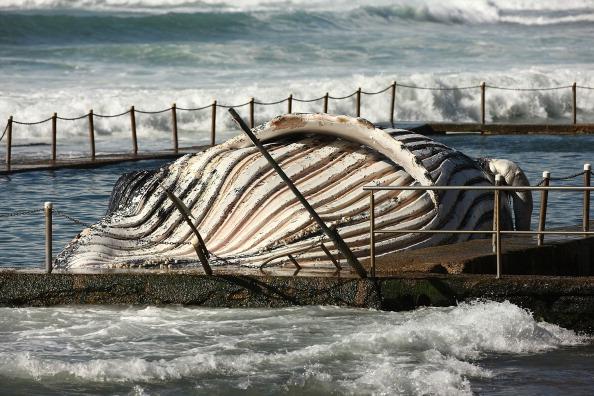Australia: 33-foot whale found dead in pool at Sydney beach (VIDEO)
The carcass of a male sub-adult humpback whale washed up at New Port Beach overnight at Newport Beach overnight on August 1, 2012 in Sydney, Australia.
Swimmers on a picturesque Sydney beach woke up to a bizarre sight — a dead whale washed up in a beachside pool.
The carcass of the dead juvenile humpback — measuring around 33 feet — was pictured lolling about at Newport Beach, on Sydney's northern beaches.
According to Australia's ABC, a sign at the beach said: "Beach closed due to whale carcass."
Whale beachings are common, but rough seas and a high tide washed this 20- to 30-ton carcass over a chain safety fence and into a public salt water swimming pool.
Shona Lorigan of the Organization for the Rescue and Research of Cetaceans in Australia warned onlookers to stay away from the carcass.
"It's very, very dangerous for everyone in the water… because we don't know how it's died, we don't know what kind of fluids, what kind of disease might be floating around with the animal," she said, the Daily Telegraph reported.
Officials warned locals not to swim near the carcass due to the risk of sharks.
The Australian Associated Press quoted Steve Messenger, a vacationing American from Newport Beach in California, as saying: "It was a little bit gross. It was like a big pile of jelly, like a big blob. You can't see the head or the tail."
One local told ABC radio that he saw the whale when he turned up for his regular morning dip.
"I swim every day and I’m not sharing my lane with that," he said.
The ABC cited a National Parks and Wildlife Service spokesman Jeff Ross as saying that it was not unusual to see old or sick humpbacks wash up in big seas.
In 2011, seven whale carcasses washed up on beaches in the state of New South Wales.
"What happens is they'll die at sea and usually that's all dealt with by those big predators that are sitting out there offshore," he said.
"In big seas the predators don't get the opportunity to deal with the carcass so it often washes in and we've seen that on several occasions over the last few years."
He added: "It's not unusual at this time of the year to see dead humpbacks. Off Sydney, we're looking at the tail end of the humpback migration, and it's at this time of the year that we start to see the sick and infirm animals coming through — the animals that just won't make it in the population.
"And having to fight against these big seas is really taking its toll and some of those animals will die offshore. Generally, they are dealt with by offshore predators such as sharks but, of course, when the seas are very rough and [there are] strong winds, it blows the carcass in shore very quickly."
Rangers were trying to determine the safest way to remove the carcass. If it wasn't washed out of the pool it at high tide, they would likely move it with a crane, cut it into pieces on the beach and bury it.
The story you just read is accessible and free to all because thousands of listeners and readers contribute to our nonprofit newsroom. We go deep to bring you the human-centered international reporting that you know you can trust. To do this work and to do it well, we rely on the support of our listeners. If you appreciated our coverage this year, if there was a story that made you pause or a song that moved you, would you consider making a gift to sustain our work through 2024 and beyond?
